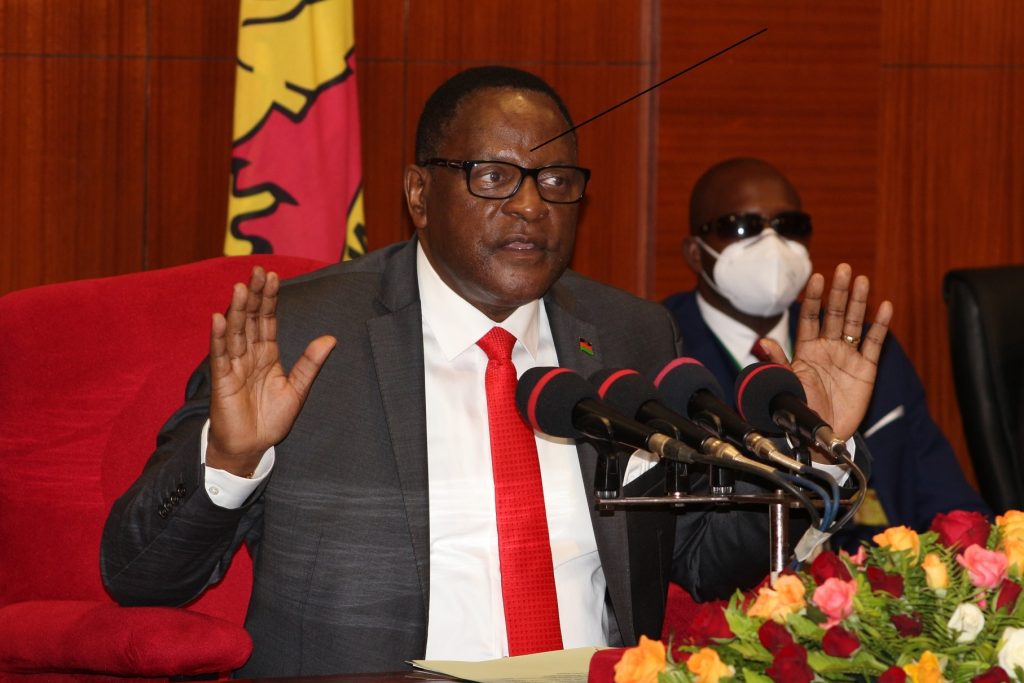Will Chakwera stick to his guns?
On July 9 2020, President Lazarus Chakwera promised to review his Cabinet by December 2020 following a public backlash on his appointment of a nepotistic and gender-imbalanced Cabinet.
In March 2021, his office said the President will appraise the Cabinet when he so wishes because appointing a Cabinet “is the President’s prerogative”. To date, there has not been a Cabinet review.

In a written response this week, presidential spokesperson Brian Banda reiterated that a Cabinet review is the president’s prerogative, saying: “Matters of Cabinet reshuffle are the prerogative of the President and he will do what is best for the country at an appropriate time. He is neither bound by law nor beholden to uninformed persons to do otherwise.”
Examples abound of the President changing tune on issues, with political analysts cautioning the indecisiveness is not good for a country that is hungry for meaningful transformation.
When Chakwera fired former Minister of Labour Ken Kandodo on April 18, 2020 over accusations that he abused Covid-19 funds, he was highly praised for taking a firm stance against public financial mismanagement.
But it did not take long for the President to change tune, as on May 9 2021 when, during a whistle-stop rally on his way to the North, he told people in Kandodo’s home district of Kasungu that the former minister was not to blame for misusing the Covid-19 funds.
Instead, the President blamed senior officers in the ministry for feeding him lies that led to his decision to fire Kandodo.
On June 25, 2021 when he launched Phase Two of the Malawi National Fibre Backbone Project in Lilongwe, Chakwera rebuked Malawi Communications Regulations Authority (Macra) board members and managers who spent K46 million on a trip to Dubai for a corporate governance workshop.
Said the President: “That the board chair of Macra could not find a more cost-effective way of enhancing the capacity of board members than taking them to Dubai and blowing millions is a clear sign that the leadership of Macra Board needs to change immediately.”
But during a State House press briefing later, presidential press secretary Brian Banda said Chakwera said the leadership “needed to change” not that it should change.
Early this month, and barely a week after Parliament passed the Labour Relations (Amendment) Bill, which is a government Bill, the President blamed officials involved for not consulting widely and said he would not assent to the Bill.
The Bill, which partly allows employers to deduct salaries or wages from employees on strike, has not gone down well with the Malawi Congress of Trade Union (MCTU), who planned to hold demonstrations last Thursday. But a day before the planned demonstrations, the President invited MCTU leaders and assured them he would not assent to the Bill.
Government Bills pass through the Ministry of Justice and Constitutional Affairs and the Attorney General’s chamber and procedures require that they are discussed by the Cabinet, chaired by the President.
The Tonse government planned July 6 independence celebrations and set aside a K244 million budget at a time the country could not afford to stock its public hospitals with drugs or afford to buy Covid-19 vaccinations, only to make a U-turn and trim the budget to K50 million after a public outcry.
Meanwhile, several political analysts have, in separate interviews, cautioned the President against such variance of decisions, saying it does not augur well for a leadership tasked with the mandate to preside over socio-political and economic transformation of the country.
In a written response, University of Malawi political scientist Blessings Chinsinga said Malawians are looking for swift and precise decisiveness with little room for trial and error.
Said Chinsinga: “While Malawians realise the enormity of the task on the shoulders of the leadership, they want to see a decisive change in how leaders handle affairs of the State. Malawians are hungry, and justifiably so, to see change that they have always dreamt about for about 60 years now.
“The President is grappling with what I would call triple systemic tension: managing matters of State as business as usual; stamping his authority to symbolise a new beginning; and the practicalities of operationalising servant and listening leadership.”
His University of Malawi counterpart Boniface Dulani blamed Chakwera for “trying to be a populist” and create a picture that he is a listening President.
He faulted the President for assuring MCTU that he would not assent to the Labour Relations (Amendment) Bill instead of defending the government Bill which may have passed through all the stages.
Said Dulani: “His flip-flops are dangerous. A good leader should stand by his policy. What Cabinet comes up with is a collective decision. Cabinet ministers, during their meetings, can agree and disagree, but at the end of the day, they come up with a collective decision which must be defended.”
On the Cabinet appointment review, he said Chakwera should simply have defended the Cabinet he appointed as he was under no obligation to tell Malawians that he would appraise his Cabinet after five months.
“He placed himself under unnecessary pressure. He should have stayed quiet than committing himself to things he is failing to do now,” Dulani said.
On his part, Professor of Law at the University of Cape Town Danwood Chirwa said the President’s indecisiveness can be put down to a lack of an understanding of the fundamental values and principles that attach to the office he occupies.
He said it also indicates that the administration does not have a clear and common agenda.
Said Chirwa: “Each party had an election manifesto, but after winning the presidential election, they seem not to have sat down and composed a shared set of policy goals and targets and set up the means of realising them. They seem to have a fragmented system, without a central point where the whole machinery of the state starts and ends.”
He said lack of focus, a credible and robust policy planning, development and implementation process will continue to rob the administration of stability and credibility.
Another political scientist Nandin Patel said the President’s indecisiveness was worrying and he appeared to be someone who is not making informed decisions.
She said: “It seems the President speaks before things have been thought through or thinking how [things] would be implemented.”
But presidential press secretary Banda, in a written response, stressed that the President has never flip-flopped on any decision he made.
He said: “The minister the President fired is still fired, and any claim that the President’s remarks in Kasungu were an apology is sheer fabrication.”
On the Macra board, the presidential press secretary said the President warned all boards against excessive expenditures and did not issue directives to fire anybody.
Said Banda: “As for the Labour Relations Bill, the President has not spoken publicly about the matter, and so he rejects the slanderous claims being advanced by those who have no mandate to speak on his behalf.”
He said any questions premised on the notion that the President is not making decisions is a result of a smear campaign that will neither prevail nor be entertained.





